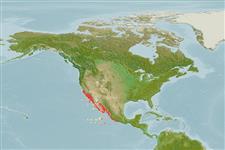Common names from other countries
>
Gadiformes (Cods) >
Macrouridae (Grenadiers or rattails)
Etymology: Nezumia: A Japanese word that means "mouse" .
More on author: Gilbert.
Environment: milieu / climate zone / depth range / distribution range
Ecología
marino batidemersal; no migratorio; rango de profundidad 581 - 1660 m (Ref. 9315). Deep-water; 3°C - 6°C (Ref. 37930); 43°N - 15°N, 124°W - 101°W (Ref. 1371)
Eastern Central Pacific: off the Pacific coast of Baja California, Mexico and the Gulf of California. Occurs northward to Washington state (43°N) (Ref 37930).
Tamaño / Peso / Age
Maturity: Lm ? range ? - ? cm
Max length : 30.5 cm TL macho / no sexado; (Ref. 41039)
Short description
Morfología | Morfometría
Espinas dorsales (total): 2; Espinas anales 0. Snout narrow, bluntly rounded, almost entirely bare, with a small inconspicuous scute at its tip. Suborbital ridge rounded and shallow in cross section, without scute-like scales. Cephalic pores of the lateralis system indistinct, but sensory papillae densely dispersed over the head. Pyloric caeca 25 to 37. Body scales small, easily shed, mostly without spinules, but some with slanting conical spinules. Overall color is Grayish brown with violet tinged; abdominal region, gill membranes and gill cover blackish; oral and branchial cavities and fins dusky to blackish.
Caught as a by-catch of trawlers fishing for Dover sole but of no commercial value (Ref. 9315). Problems with taxonomy. Shallowest depth record from Ref. 37930.
Life cycle and mating behavior
Madurez | Reproducción | Puesta | Huevos | Fecundidad | Larva
Cohen, D.M., T. Inada, T. Iwamoto and N. Scialabba, 1990. FAO species catalogue. Vol. 10. Gadiform fishes of the world (Order Gadiformes). An annotated and illustrated catalogue of cods, hakes, grenadiers and other gadiform fishes known to date. FAO Fish. Synop. 125(10). Rome: FAO. 442 p. (Ref. 1371)
IUCN Red List Status (Ref. 130435)
CITES (Ref. 128078)
Not Evaluated
Threat to humans
Harmless
Human uses
Pesquerías: pesquerías de subsistencia
Más información
ReferenciasAcuiculturaPerfil de acuiculturaRazasGenéticaElectrophoresesheritabilidadEnfermedadesProcesamientoMass conversion
Herramientas
Special reports
Download XML
Fuentes de Internet
Estimates based on models
Preferred temperature (Ref.
115969): 3.8 - 4.9, mean 4.1 (based on 23 cells).
Phylogenetic diversity index (Ref.
82804): PD
50 = 0.5000 [Uniqueness, from 0.5 = low to 2.0 = high].
Bayesian length-weight: a=0.00166 (0.00100 - 0.00276), b=3.12 (2.97 - 3.27), in cm Total Length, based on LWR estimates for this species & (Sub)family-body (Ref.
93245).
Nivel trófico (Ref.
69278): 3.3 ±0.1 se; based on size and trophs of closest relatives
Resiliencia (Ref.
120179): Alto, población duplicada en un tiempo mínimo inferior a 15 meses (Preliminary K or Fecundity.).
Fishing Vulnerability (Ref.
59153): Low vulnerability (22 of 100).
